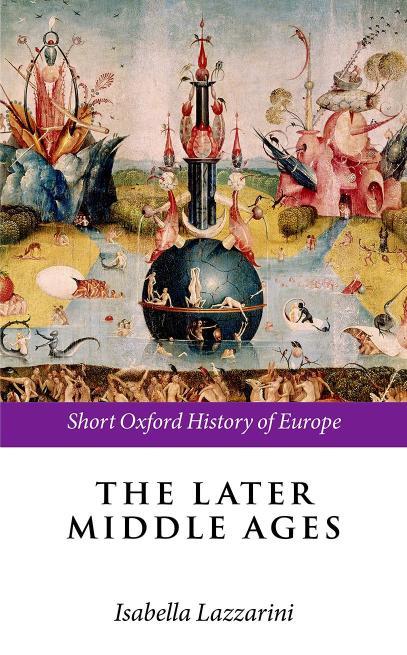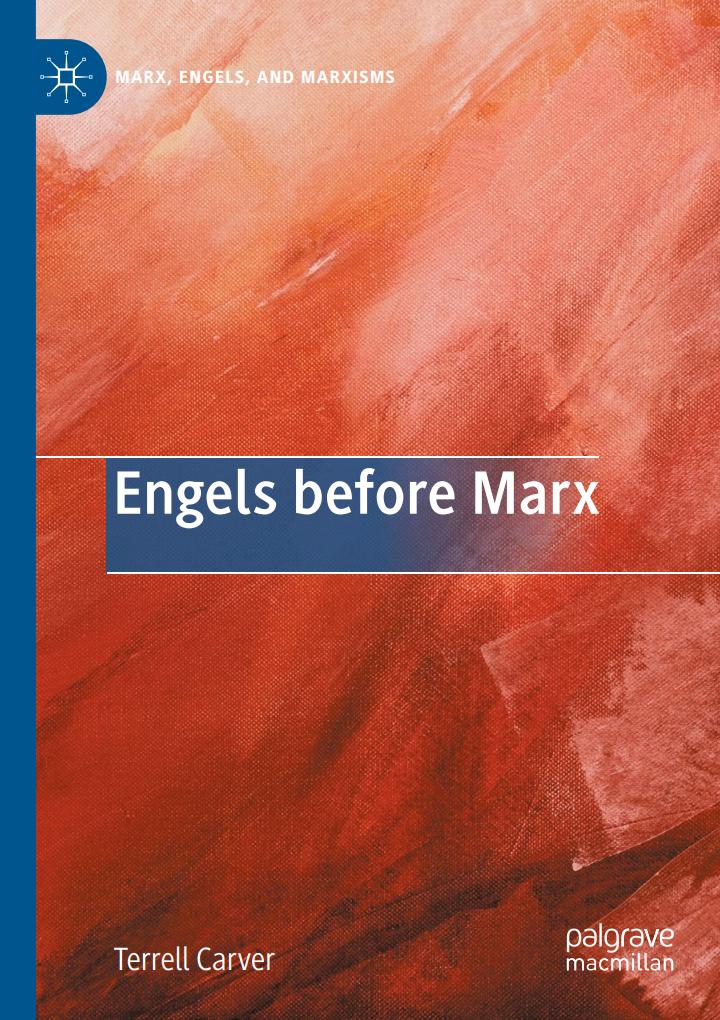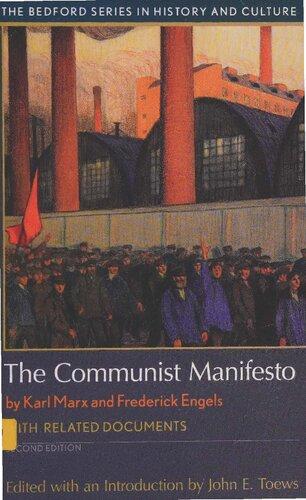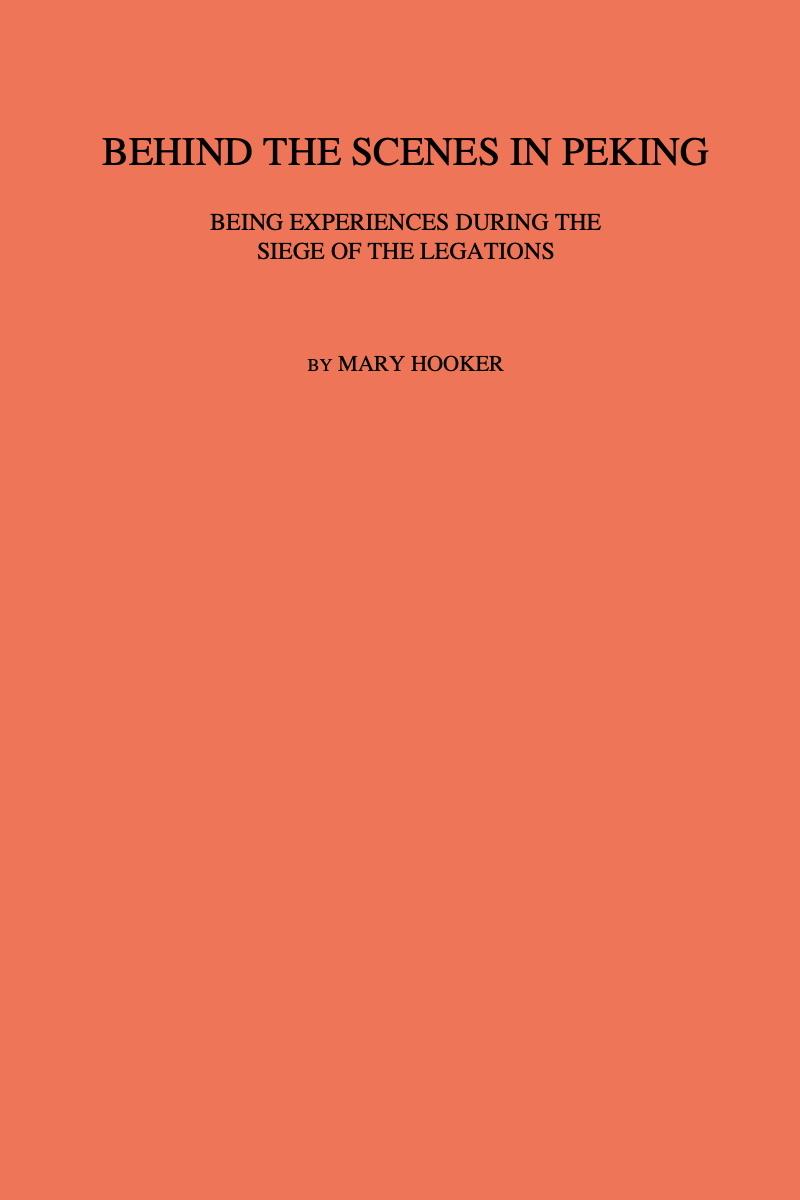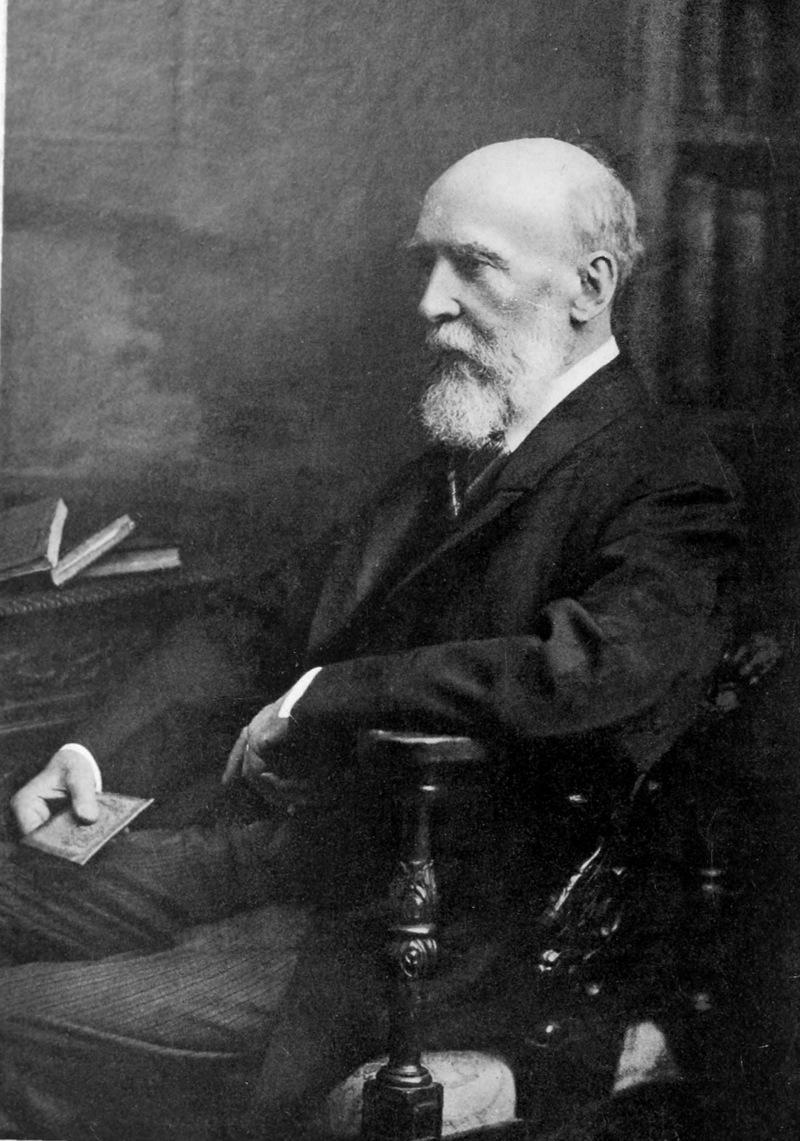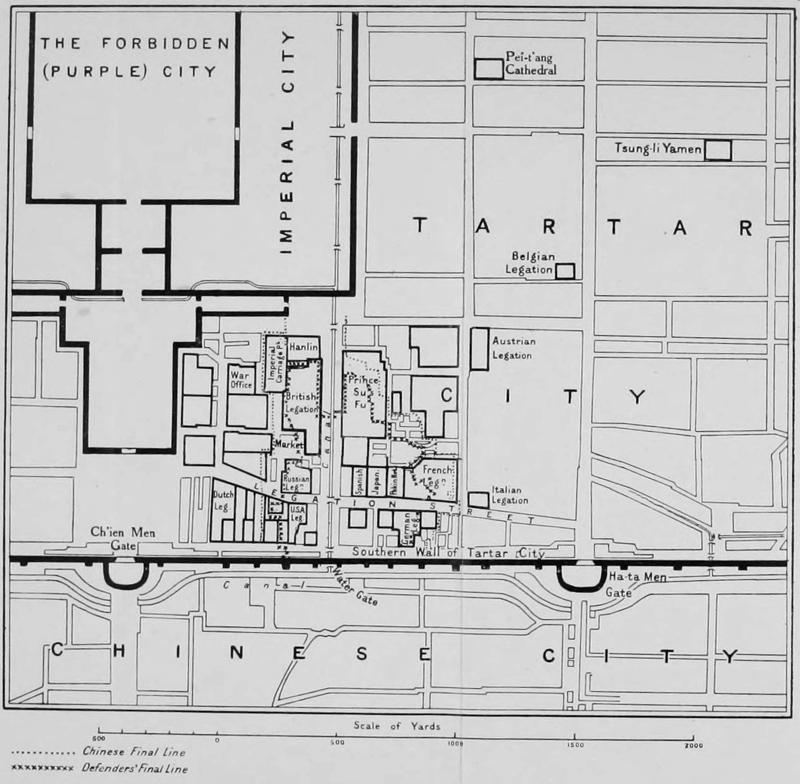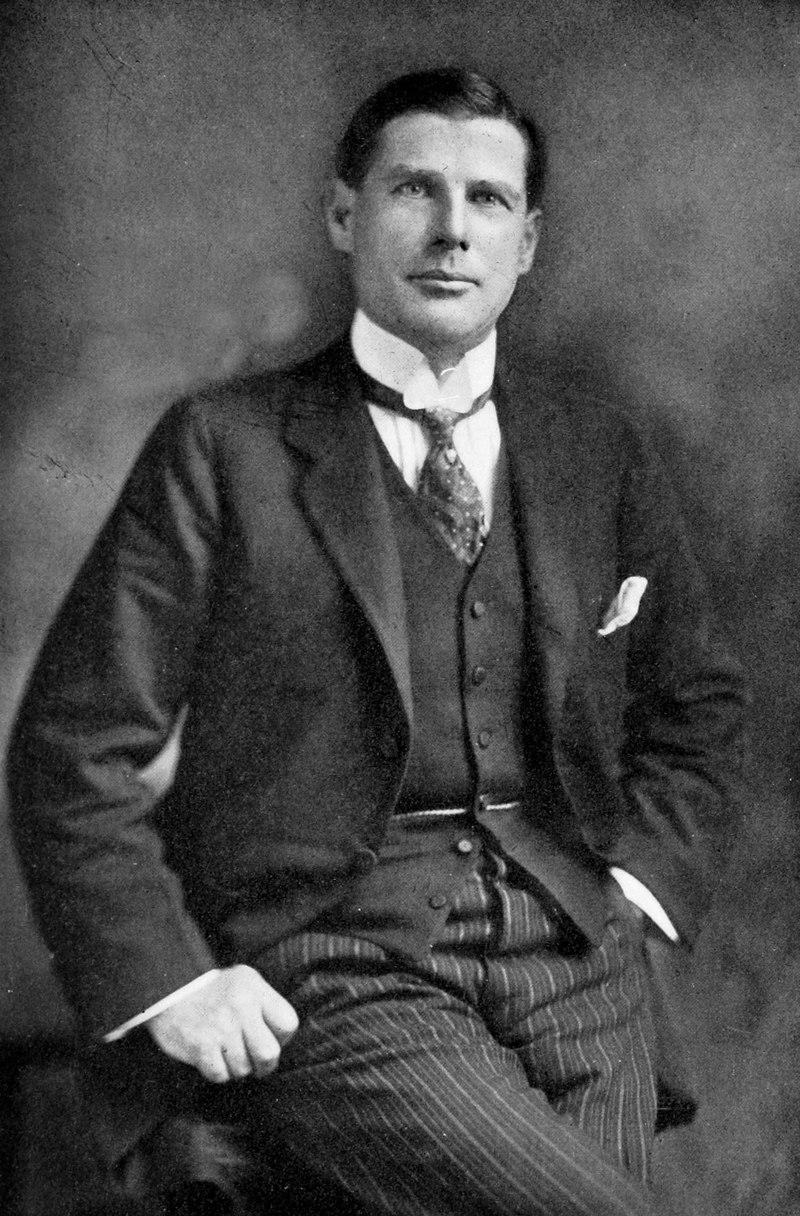PREFACE
It does not fall to the lot of every woman—or man, either—to go through a siege, especially one so remarkable, and, indeed, unique in many of its features, as that of the Legations in Peking.
The feeling that my experiences were out of the common, and present new aspects of famous events, during which I was, to a certain extent, at the same time on the stage and behind the scenes, has induced me to publish the following pages. They are taken from letters, owing to circumstances never sent, and my diary, written spasmodically throughout the siege. While trying to introduce something of the lighter side of life, and speaking of various incidents, humorous and otherwise, I have endeavoured to avoid all that can give offence or displeasure to those mentioned. If in any case I have unwittingly failed in this endeavour, I crave pardon.
My thanks are due to Mrs. Woodward for giving permission to reproduce her unique siege photographs.
MARY HOOKER.
September,1910.
MRS. HOOKER, MISS ARMSTRONG, LADY
MACDONALD’S LITTLE GIRLS, FARGO SQUIERS, AND COLONEL ARTHUR CHURCHILL
THEFORBIDDEN(PURPLE)CITYIMPERIALCITY
BEHIND THE SCENES IN PEKING
May26,1900.
When you were in Peking last year I don’t know whether you got out to the hills or not. They are about fifteen miles from the imperial city, and are the nearest point where foreigners can find relief from the insufferable heat of the capital, which begins with an intensely hot spring, continuing through a long, damp, sizzling summer.
Many of the diplomats have cottages and bungalows at Pei-ta-ho, on the seashore, but its distance from Peking is a great drawback to it as a summer residence, and they have been forced to accept the hills, as a nearer and more practical place for their summer colony.
A large, commodious house has been built here for the British Minister, as well as one for the officials of the Customs, both within their respective compounds. The greater part of this colony, however, have simply leased temples from Buddhist priests, and converted them into the most attractive and livable summer homes, the American and Russian Legations being the principal of these.
A huge, white pagoda, belonging to the temple of Linqua Su, in the centre of this district, with its temples of Buddha and houses of its priests surrounding it, is perched on the top of a hill at the base of Mount Bruce, and for miles around is the most picturesque feature of the landscape. In the highest point of this pagoda is hung a wonderful bell, the only motive-power of which is the wind, and which was placed there by the Chinese to frighten the evil spirits of the air. When the breeze is strong, which is often the case, the bell
seems to thresh itself into a veritable fury, and again at midday, when the breeze is light, one can just distinguish the faintest tinkle.
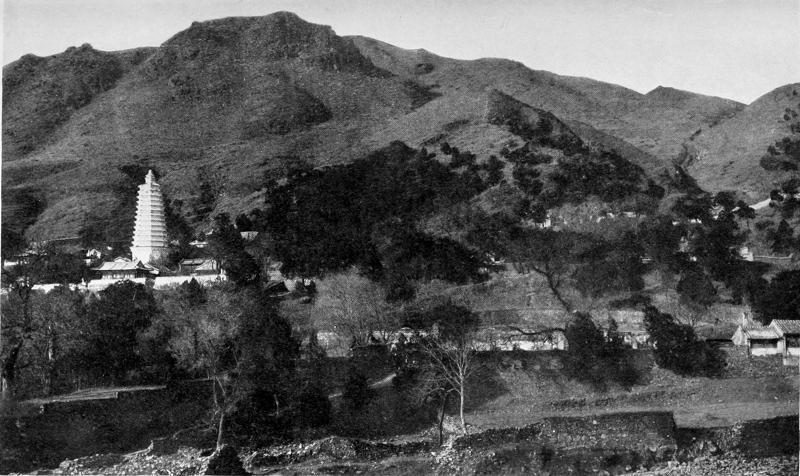
High up in these hills, and built on the sides of Mount Bruce, stand these temples with their subordinate and associated buildings, each making up a separate community. Ours is somewhat above the temple of Linqua Su, with its white pagoda, and is built on a most wonderful natural shelf of the mountain-side. A terrace, edged by a low, ivy-covered parapet, runs the length of our temple home, from which we look right out on the world beneath us, down the valley towards Peking; or, if we look above us, it is to see Mount Bruce rise perpendicularly against the sky. Ancient and big are the stones that pave the outer and inner courts of this temple, and as picturesque as they are difficult to use are the stone steps, formed of heavy and irregular slabs, which lead down to the valley or ascend up unto the mountain, from which steps finally emerge innumerable tracks, leading in their turn to shrines, homes of hermits, and temples built
WHITE PAGODA IN THE TEMPLE OF LINGUA SU
on this continuous ridge. Nor is this barbaric and ancient setting for a modern life made less extraordinary by the fact that one is served by quiet, intelligent, besatined servants, who glide about and look as if they had stepped into life straight from the half-fabulous days of Kubla Khan; and you feel they have always been thus, and always will be, and you wonder how it is that although the spirit of the twentieth century is certainly felt in China, it is little seen.
May27.
To-day we started off on a long tramp, making first the ascent of Mount Bruce, which was so difficult at times that we could scarcely accomplish it, and had we not had the help of a young houseservant, known to us as “Number Three Boy,” I doubt if we could have reached the summit. The wind whistled round the high peaks of Mount Bruce to such an extent that Mrs. Squiers and I had to hold on to each other to keep from being blown off our feet.
From here we could see the Empress-Dowager’s summer palace and grounds, spread out below us like a toy garden, with its wonderful landscape effects and its series of artificial waterways. Then, perched high up on a mountain, we could see a white temple belonging to the eunuchs of the palace, and reserved solely for their use during the summer months; and to the west the Feng-tai station of the Peking-Paoting-fu Railway, winding through the valleys below us like a piece of grey thread. We then walked through the enclosure of the temple occupied by the Russian Legation, and in passing through a half shrine, half summer-house, most unexpectedly came to a wall upon which was drawn a rough but cleverly executed head of a lovely young girl. It was done in coloured pastels, and had been drawn by some artist diplomat. The subject was the Countess Marguerite Cassini, niece of the Russian Minister, who had been stationed in Peking some years previous. It was a beautiful bit of work, and was especially startling when seen surrounded by the hideous, grinning faces of Buddhist gods.
Heading for our own temple of Linqua Su, we walked miles, keeping to the top of a ridge, where the views were gorgeous and the air wonderful, and quite suddenly came upon a shepherd and his flock. Fancy it, a Chinese shepherd tending his Chinese sheep! His expression was gentler and happier by far than that of men leading a like monotonous existence in the mountains of Switzerland or elsewhere in the West. Could it be that there the shepherd longs to return to the life in the villages, while here the life of the poorest classes in the village communities is so hopeless a struggle that individual members are glad to leave the hopelessness of it and tend their flocks alone upon the mountains? This fascinating China! you have been here, and you know it. I must not bore you with my impressions, for if I attempted such a thing these letters to you would assume the proportions of an encyclopædia.
May27(continued).
Mr. Squiers returned to the American Legation this morning. He only gets out to the hills twice a week in time to dine and returns to Peking the following morning. He tells us that the Boxers daily become more daring, but the diplomats and people in general put these things down to the usual spring riots which yearly seize Peking, and are due to hunger and disease, prevalent among the poorer classes after a long, hard winter. Nevertheless, it was deemed wise to inform the Tsung-li Yamen (the Foreign Office) that we were in the hills at the temple of Linqua Su, and would expect official protection from all rioters or malcontents who might be in this region, and a guard of twelve Chinese soldiers was promptly detailed to protect “nos personnes et nos biens.” But such soldiers!—operabouffe mannikins in a Broadway theatre would frighten one with their martial air compared to these ridiculous apologies for soldiers, which were sent to us for our protection, their only weapons being dull-pointed rusty spears!
Clara, the German governess, returned from Peking to-day, where she had gone to do some shopping, and tells us that all the natives
she passed seemed to be armed, and that in all the temple enclosures companies of Chinese were being drilled.
Our servants, mostly native Christians, assure us that these people are all Boxers, most of them flaunting the red sash, the insignia of that Society, and that they are preparing for a general uprising when the time shall be ripe—an uprising that has for its watchword, “Death and destruction to the foreigner and all his works, and loyal support to the great Ching dynasty.”
May28.
The peace that settles on one after a long tramp in the mountains was rudely broken up for us a short while after our return from our walk yesterday, when we found ourselves thrown into the midst of a most exciting situation, from which we knew the chances were about even whether we should escape with our lives.
We could see from our mountain balcony that the railroad station at Feng-tai, with its foreign settlement, was burning. The immense steel bridge was gone, too, showing that dynamite and high explosives had been used to destroy it. The locality was thick with smoke and the flames sky-high. Our servants told us our highly picturesque guard of twelve had run away as soon as they were sure the Boxers were burning Feng-tai, for, they argued, the mob will surely sack this foreign-devil temple when they finish with Feng-tai. Since they had begun, they certainly would not desist until everything foreign this side of Peking was sacked and burned, and this guard had no desire to pose as the guardians of foreigners, but thought it much safer to join the so far victorious rabble at Feng-tai. We also learned that over a hundred men engaged in agricultural and other peaceful occupations in and around the temples, of which ours was one, had left during the day to join the Boxers.
Our position now, to say the least, was critical. Not a foreign man on the place to protect us; a quantity of badly frightened Chinese servants to reassure; three children, their governesses and
ourselves, to make plans for. We did what women always have to do —we waited; and our reward came when we saw down in the valley a dusty figure ambling along on a dusty Chinese pony, coming from the direction of Feng-tai and making direct for our temple. It was Dr. Morrison, correspondent of the London Times, and an intimate friend of the Squierses.
On hearing early in the day of the mob at Feng-tai, and the burning of the place, he promptly started off in that direction to get as near as possible to the scene of action, and ascertain for himself if the wild rumours circulating in Peking were truths before cabling them to London. Finding the worst corroborated by what he saw from a point near the mob, yet unseen by it, he started on his return trip to Peking, hot haste for the cable office, when he became oppressed with the startling remembrance that we were at the temple, and probably alone and unprotected. So, instead of returning to Peking, he promptly came to us. He feared lest Mr. Squiers had not heard of the burning of Feng-tai, or, if he had heard of it, that possibly the city gates might be closed against the approaching mob, and he might be unable to leave the capital that night. The fact that our temple was directly on the line of march to Peking for the rioters made it look to Dr. Morrison as a most probable possibility that they would stop chez nous before proceeding to the capital. In case of such horrible eventuality he hoped to defend us for a while, and to send to glory as many Chinese as possible before turning up his own toes!
He was studying a possible defence of our balcony-home when Mr. Squiers arrived post-haste, bringing with him a Russian Cossack, whom he had borrowed from the Russian Minister. Plans were now made to defend the place from attack or incendiaries during the night. The Chinese servants worked with a will—our successful defence meant safety for us and life for them. Sentry work of the most careful sort continued all night, as well as the packing up of our clothes and valuables.
At 6 a.m. we were en route for Peking—an enormous caravan— most of us in Chinese carts, some riding ponies, mules, or donkeys, the forty servants placing themselves wherever they could— anywhere, in fact—so that they should not be left behind. The three protectors, heavily armed, rode by us, and three or four of the Chinese were armed also, and the carts held such a position in the caravan that in a moment they could be swung round as a defence in case of an attack.
The fifteen miles through which we travelled were utterly deserted except for the long, lonely lines of coal-carrying dromedaries. It seemed as if the country people en masse had deserted their villages and gone to some rallying-point for a demonstration; and how anxiously and slowly each half-hour of the trip passed, for, while it brought us nearer to our Legation, it also brought us nearer to the possibility that our caravan would run into yesterday’s rioters with added numbers of to-day’s malcontents.
At 10.30 we reached the American Legation compound, and most painfully but thankfully we untwisted ourselves from the awful position we were forced to take in the cart, and joyously grasped the hands of friends. William Pethick, Li Hung Chang’s private secretary for twenty years, a person of tremendous influence with the Chinese, was in the compound, and was on the point of going to the War Office to demand a regiment to go with him to our rescue out in the hills. He had feared for us desperately during the night following the burning of Feng-tai.
May30.
The times have become so dangerous that no women are allowed to leave the compound, but, of course, the diplomats and the military—such as are here—must move about and try to find out what the situation really is. The people who know the most about it are the most pessimistic as to what may happen before the marines arrive from Tien-tsin.
We were glad to hear that the Belgian officials at the Feng-tai station had heard of the intentions of the Chinese to burn them and the place, and had escaped to Peking without loss of life.
All the Legations that have battleships at Taku wired some days ago to them, and we are looking for a total of about three hundred marines of all nationalities to reach Peking at any moment.
Legations, such as the Belgian and Austrian, which are some distance from the Legation centre, are forced to do constant sentry work to guard against thieves and incendiaries; the Ministers’ secretaries, and their foreign servants take turn night and day. They are so surrounded by small streets and alleys that a few rioters could rush their Legations easily, and they are forced to keep the most alert watch. Melotte, the big blonde Belgian secretary, came to tea to-day, and gave us a most vivid description of the difficulties of their tiny garrison.
Sir Robert Hart, the beloved Inspector-General of the Customs, dropped in also, and, while he seems fairly sanguine about the present situation, I must say the tales of China and the Chinese that he unfolded to us were quite terrible. Especially the massacre of the Portuguese at Ning-po in 1870 by the Chinese in retaliation for their having taken so much of the Yangtse River trade made a stirring story when coming from his lips.
He was with that fascinating Englishman commonly known as “Chinese Gordon” when he was the central figure in the history of China during the early part of this century, and when Sir Robert was quite a young man. I was so obviously spellbound by these real reminiscences that, to my surprise and joy, he offered to send me, on his return to his compound, a photograph of himself taken with Gordon, marked with the latter’s autograph. I can’t say, however, that his visit reassured us in our present dangerous situation.
Before leaving he looked at Mr. Squiers’s wonderful collection of antique Chinese porcelains, which Mr. Pethick, a connoisseur in these things, has collected for him. The Dana Collection was also procured
by him. Sir Robert is certainly a delightful person, and the cobaltblue tie twisted into a most unusual knot around his low collar gives his personal appearance a tinge of rakishness and eccentricity.
This afternoon Dr. Morrison and some Customs students rode down toward the station of Magi-poo to take a look at the congested market-places and collections of angry rioters. Directly they were seen they were furiously stoned, but as their Chinese ponies were fleet of foot, they escaped with a few bruises.
May31.
All day to-day everyone is wondering, “Will the marines get here to-night?” A wire came through Admiral Kempff, saying they were entrained. Last night we dined at Sir R. Hart’s, and danced until twelve. He has two bands, brass and string, of Chinese musicians whom he has taught. The secretary of the German Legation took me out to dinner—Von Below, a most soldierly-looking person.




